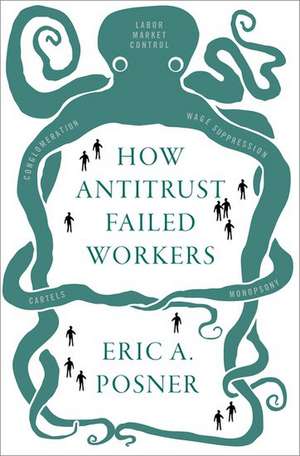How Antitrust Failed Workers
Autor Eric A. Posneren Limba Engleză Hardback – 18 noi 2021
Preț: 165.39 lei
Preț vechi: 210.79 lei
-22% Nou
Puncte Express: 248
Preț estimativ în valută:
31.66€ • 34.40$ • 26.61£
31.66€ • 34.40$ • 26.61£
Carte disponibilă
Livrare economică 21-27 martie
Livrare express 15-21 martie pentru 73.68 lei
Preluare comenzi: 021 569.72.76
Specificații
ISBN-13: 9780197507629
ISBN-10: 019750762X
Pagini: 224
Dimensiuni: 239 x 152 x 23 mm
Greutate: 0.48 kg
Editura: Oxford University Press
Colecția OUP USA
Locul publicării:New York, United States
ISBN-10: 019750762X
Pagini: 224
Dimensiuni: 239 x 152 x 23 mm
Greutate: 0.48 kg
Editura: Oxford University Press
Colecția OUP USA
Locul publicării:New York, United States
Recenzii
In his timely and important book, University of Chicago law professor Eric Posner provides a comprehensive account of antitrust's failure to address employer consolidation and various anticompetitive methods to suppress wages.
... elegantly argued work... provides useful ideas for dealing with the antitrust hurdles impacting the labor sector.
A tight, progressive reasoning for the exercise of antitrust labor market protection.
This important book develops the 'new learning' about labor market power. The returns to capital and those to labor have diverged sharply, reducing labor's participation rate in business profits. One reason is that labor markets are smaller than we once thought, giving employers more power to suppress wages. As Posner explains with clarity and force, antitrust has too often looked askance when confronted with anticompetitive practices targeting labor, such as overly aggressive noncompetition agreements, franchise restraints on worker mobility, and mergers that put downward pressure on wages. An important read for anyone interested in policy concerning competition, labor, and economic equality.
Antitrust law has long turned a blind eye to the role of employer market power in slow wage growth and growing inequality. Eric Posner provides a much-needed corrective with his compelling, comprehensive and carefully reasoned documentation of the failures of the current system. More importantly, Posner lays out a reform agenda to address everything from outright collusion in wage setting to noncompete agreements. This book should be required reading for anyone who wants to understand the problems with American labor markets or is seeking to fix them.
Recent decades have seen a big shift in the balance of power in the job market away from workers and toward big employers, and it has contributed to the rise in inequality. Posner explains how antitrust policy might have helped prevent it and reduce inequality. Antitrust fights anticompetitive practices that harm consumers and it could fight anticompetitive practices in the job market that harm workers the same way. The book melds the new economic thinking on the topic with Posner's keen legal insight in an accessible way.
... elegantly argued work... provides useful ideas for dealing with the antitrust hurdles impacting the labor sector.
A tight, progressive reasoning for the exercise of antitrust labor market protection.
This important book develops the 'new learning' about labor market power. The returns to capital and those to labor have diverged sharply, reducing labor's participation rate in business profits. One reason is that labor markets are smaller than we once thought, giving employers more power to suppress wages. As Posner explains with clarity and force, antitrust has too often looked askance when confronted with anticompetitive practices targeting labor, such as overly aggressive noncompetition agreements, franchise restraints on worker mobility, and mergers that put downward pressure on wages. An important read for anyone interested in policy concerning competition, labor, and economic equality.
Antitrust law has long turned a blind eye to the role of employer market power in slow wage growth and growing inequality. Eric Posner provides a much-needed corrective with his compelling, comprehensive and carefully reasoned documentation of the failures of the current system. More importantly, Posner lays out a reform agenda to address everything from outright collusion in wage setting to noncompete agreements. This book should be required reading for anyone who wants to understand the problems with American labor markets or is seeking to fix them.
Recent decades have seen a big shift in the balance of power in the job market away from workers and toward big employers, and it has contributed to the rise in inequality. Posner explains how antitrust policy might have helped prevent it and reduce inequality. Antitrust fights anticompetitive practices that harm consumers and it could fight anticompetitive practices in the job market that harm workers the same way. The book melds the new economic thinking on the topic with Posner's keen legal insight in an accessible way.
Notă biografică
Eric A. Posner is Kirkland and Ellis Distinguished Service Professor of Law, University of Chicago. His most recent books are Radical Markets (with Glen Weyl), which was named a best book for 2018 by The Economist; and Last Resort: The Financial Crisis and the Future of Bailouts, which was named a best book for 2018 by The Financial Times. He is of counsel at MoloLamken LLP, a fellow of the American Academy of Arts and Sciences, and a member of the American Law Institute. He has written extensively for popular media outlets, including The New York Times, The Wall Street Journal, and The Washington Post, and testified before Congress.
